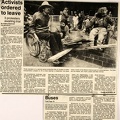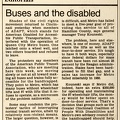8B The Cincinnati Post, Tuesday,May 20, 1986 [Two articles in this clip.]
PHOTO Patrick Reddy/The Cincinnati Post: A man in a power wheelchair (Rick James) with a leather hat with a wide brim, sits in a semi-reclined position, hand partially hidden by his sleeve, finger on the joystick. On the side of Rick's chair you can see an ADAPT "We Will Ride" sticker. Two police officers are behind him; one is standing holding the push handles on his chair, the other is squatting down and sticking his nightstick through the spokes of Rick's chair. Behind them is the street and bus, and behind that some city buildings.
Caption reads: A Cincinnati police officer jams a nightstick into the spokes of a wheelchair to prevent Rick James of Salt Lake City from blocking a Queen City Metro bus Monday at Government Square.
Title: Activists block buses’ route
By Edwina Blackwell, Post Staff reporter
On a stretch or road near the College Football Hall of Fame, strong beliefs over the rights of the handicapped to public transportation confronted the steel frames of buses.
lt happened Monday night when 15 disabled activists rolled into the pathway of vehicles traveling 40 mph.
Seven buses carrying conferees attending the eastern meeting of the American Public Transit Association in Cincinnati were on their way to the Hall of Fame at Kings Island in Warren County for a reception. As the buses neared the Hall around 6:30 pm about 15 members of American Disabled for Accessible Public Transportation moved onto the road, blocking a portion of Kings Island Drive.
Police had set up barricades by the hall earlier. However, that didn't keep the ADAPT members from rolling onto the roadway.
"I remember flashing in my mind that these might be the first deaths of the civil rights movement of the handicapped," said the Rev. Wade Blank of Denver, Colo., co-founder of ADAPT.
No one was injured and no arrests were made.
But the members of the Denver-based group say their action shows how far they are willing to go. The protesters want the transit officials to change their national policy on accessibility and Queen City Metro to have wheelchair lifts on all new buses.
Today ADAPT members plan to demonstrate in front of the Westin Hotel, where the APTA convention is being held.
There were also disabled people riding the buses that were halted Monday night. Dixie Harmon was one of the people who got off the bus Monday in the midst of the ADAPT protest. Ms. Harmon, a quadriplegic in a wheelchair. is co-chairwoman of the Specialized Transportation Advisory Committee, a local committee which works with Queen City Metro in reviewing handicapped needs.
But when she met her peers on the protest line, the reaction was less than cordial. Both she and Dan Cleary, president of the Greater Cincinnati Coalition of People with Disabilities, were subjected to name calling for their decision not to demonstrate. Wednesday she will be on a APTA panel discussing transit system services to disabled individuals.
"I was very uncomfortable," she said of the Monday night confrontation. "(But) I have to understand that they're angry, too."
Queen City Metro and Cincinnati police say they are ready for any more protests during the convention, which ends Thursday. Judith Van Ginkel, director of Metro communications, said bus drivers have been instructed to stop immediately and call police if a protester tries to block the vehicles.
Earlier Monday, three ADAPT members — Michael Auberger, Bob Kafka and George Cooper—were arrested and charged with disorderly conduct for attaching themselves to Metro buses downtown.
[Second Article]
Title: Disabled lament lack of transportation beyond city limits
By Edwina Blackwell
Post staff reporter
For Linda Geraci, ACCESS provides a step toward independence.
Every weekday morning, she can expect to see the specially equipped van in front of her apartment, ready to transport her to work. Confined to a wheelchair because of muscular dystrophy, she needs the lift-equipped vehicle to survive on her own.
For many, ACCESS inhibits mobility, however, because it does not travel beyond Cincinnati city limits.
"lf we want to go in a closed mall, there is none inside city limits. Most of your movie theaters seem to be in those areas also," said Ms. Geraci, a counselor at Total Living Concepts Inc., an organization that promotes independent living among handicapped individuals.
Riders who utilize the curb-to-curb service of ACCESS must make reservations at least 24 hours In advance and preferably one week in advance. The 19 specialized transportation vans used for the elderly and the disabled serve only Cincinnati proper in addition to Elmwood Place, St. Bernard and Norwood.
Even short trips like running to the grocery store must be scheduled in advance.
"You tell them when you want to go and when you want them to come get you and you hope that your ice cream doesn't melt," Ms. Geraci said.
Dixie Harmon, co-chair of the Greater Cincinnati Coalition of People With Disabilities, said the scheduling becomes an invasion of privacy for the individual because ACCESS knows your every move.
Several local handicapped organizations have publicly supported the demonstrations of American Disabled for Accessible Public Transportation although they shy away from their methods.
- Created on
- Thursday 11 July 2013
- Posted on
- Wednesday 8 June 2016
- Tags
- 24 hour advanced reservation, ADAPT - American Disabled for Accessible Public Transportation, APTA reception, blocking buses, Bob Kafka, College Football Hall of Fame, disability rights movement, Dixie Harmon, George Cooper, Greater Cincinnati Coalition of Persons with Disabilities, Mike Auberger, privacy, Rick James, service area, Wade Blank, We will ride
- Albums
- Visits
- 3536
- Rating score
- no rate
- Rate this photo


0 comments